Sociology Assignment: Canadian Indigenous Legal Framework Analysis
VerifiedAdded on 2023/01/19
|10
|2156
|98
Essay
AI Summary
This sociology assignment provides a comprehensive overview of the historical and legal context of Indigenous studies in Canada. It begins with the Royal Proclamation of 1763 and its significance in establishing a framework for treaty negotiations with Aboriginal inhabitants, as well as its impact on the American Revolution. The paper then discusses the concept of Indian title, the Indian Act of 1850, and the British North America Act of 1867, highlighting their impact on Indigenous rights and governance. The assignment also explores the Rupertsland and North-Western Territory Order of 1870, the Manitoba Act of 1870, and the Natural Resources Transfer Agreement of 1930, analyzing their effects on land rights and resource control. Finally, it examines the numbered treaties, outlining their terms and their ongoing impact on Indigenous communities. The assignment concludes by connecting these elements, emphasizing their collective role in shaping the legal and social-economic realities of Indigenous peoples during the colonial era and their enduring influence on contemporary issues.
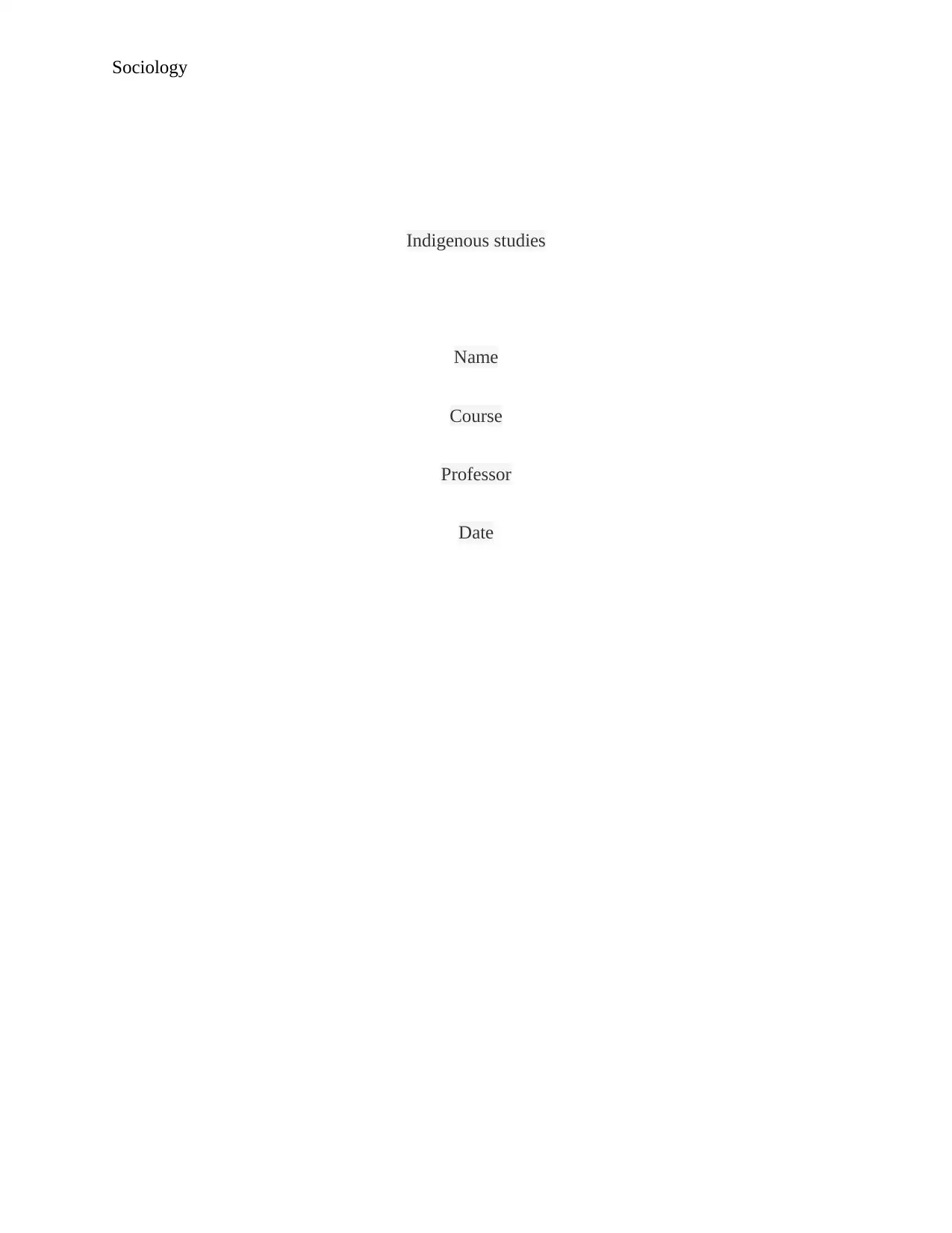
Sociology
Indigenous studies
Name
Course
Professor
Date
Indigenous studies
Name
Course
Professor
Date
Paraphrase This Document
Need a fresh take? Get an instant paraphrase of this document with our AI Paraphraser
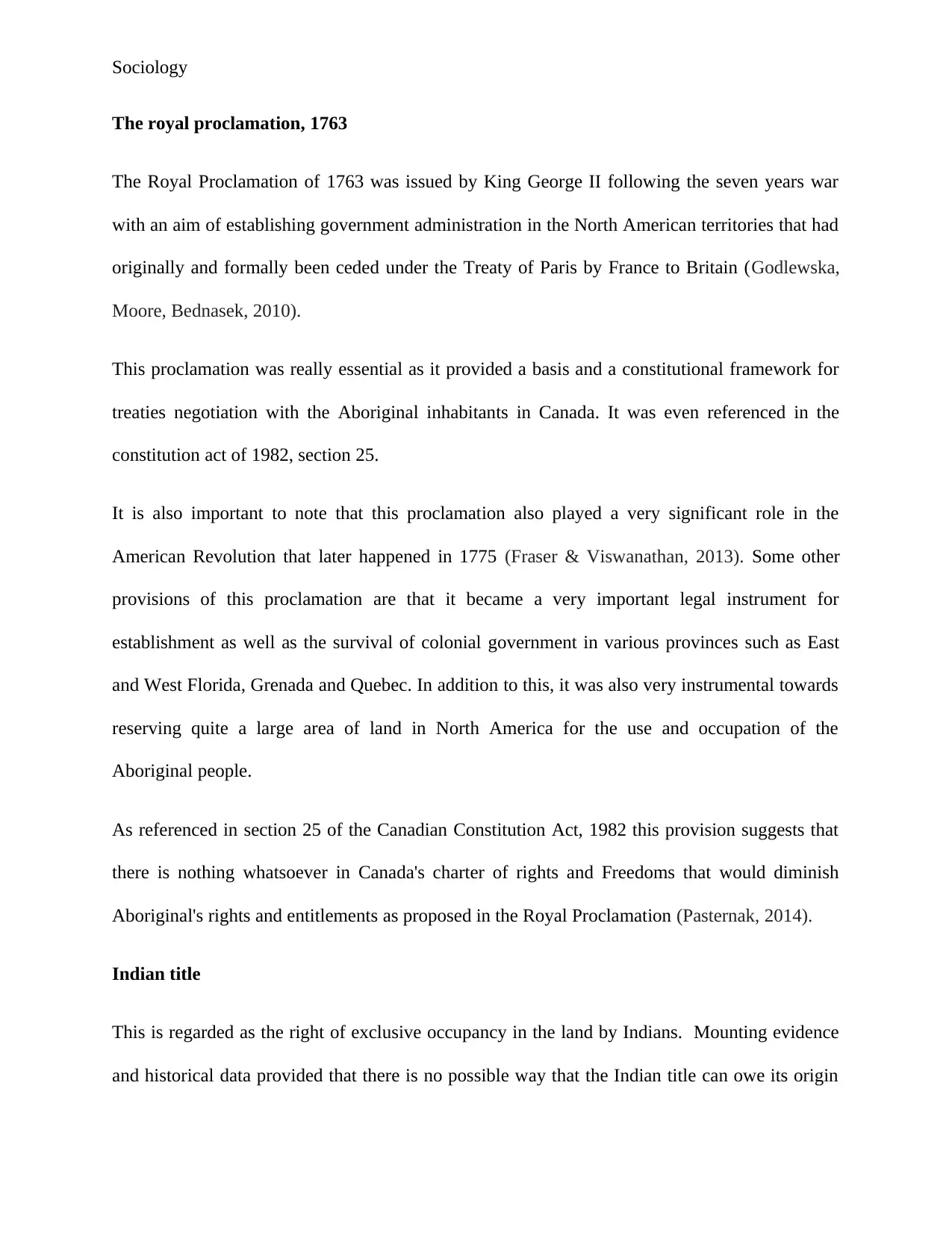
Sociology
The royal proclamation, 1763
The Royal Proclamation of 1763 was issued by King George II following the seven years war
with an aim of establishing government administration in the North American territories that had
originally and formally been ceded under the Treaty of Paris by France to Britain (Godlewska,
Moore, Bednasek, 2010).
This proclamation was really essential as it provided a basis and a constitutional framework for
treaties negotiation with the Aboriginal inhabitants in Canada. It was even referenced in the
constitution act of 1982, section 25.
It is also important to note that this proclamation also played a very significant role in the
American Revolution that later happened in 1775 (Fraser & Viswanathan, 2013). Some other
provisions of this proclamation are that it became a very important legal instrument for
establishment as well as the survival of colonial government in various provinces such as East
and West Florida, Grenada and Quebec. In addition to this, it was also very instrumental towards
reserving quite a large area of land in North America for the use and occupation of the
Aboriginal people.
As referenced in section 25 of the Canadian Constitution Act, 1982 this provision suggests that
there is nothing whatsoever in Canada's charter of rights and Freedoms that would diminish
Aboriginal's rights and entitlements as proposed in the Royal Proclamation (Pasternak, 2014).
Indian title
This is regarded as the right of exclusive occupancy in the land by Indians. Mounting evidence
and historical data provided that there is no possible way that the Indian title can owe its origin
The royal proclamation, 1763
The Royal Proclamation of 1763 was issued by King George II following the seven years war
with an aim of establishing government administration in the North American territories that had
originally and formally been ceded under the Treaty of Paris by France to Britain (Godlewska,
Moore, Bednasek, 2010).
This proclamation was really essential as it provided a basis and a constitutional framework for
treaties negotiation with the Aboriginal inhabitants in Canada. It was even referenced in the
constitution act of 1982, section 25.
It is also important to note that this proclamation also played a very significant role in the
American Revolution that later happened in 1775 (Fraser & Viswanathan, 2013). Some other
provisions of this proclamation are that it became a very important legal instrument for
establishment as well as the survival of colonial government in various provinces such as East
and West Florida, Grenada and Quebec. In addition to this, it was also very instrumental towards
reserving quite a large area of land in North America for the use and occupation of the
Aboriginal people.
As referenced in section 25 of the Canadian Constitution Act, 1982 this provision suggests that
there is nothing whatsoever in Canada's charter of rights and Freedoms that would diminish
Aboriginal's rights and entitlements as proposed in the Royal Proclamation (Pasternak, 2014).
Indian title
This is regarded as the right of exclusive occupancy in the land by Indians. Mounting evidence
and historical data provided that there is no possible way that the Indian title can owe its origin
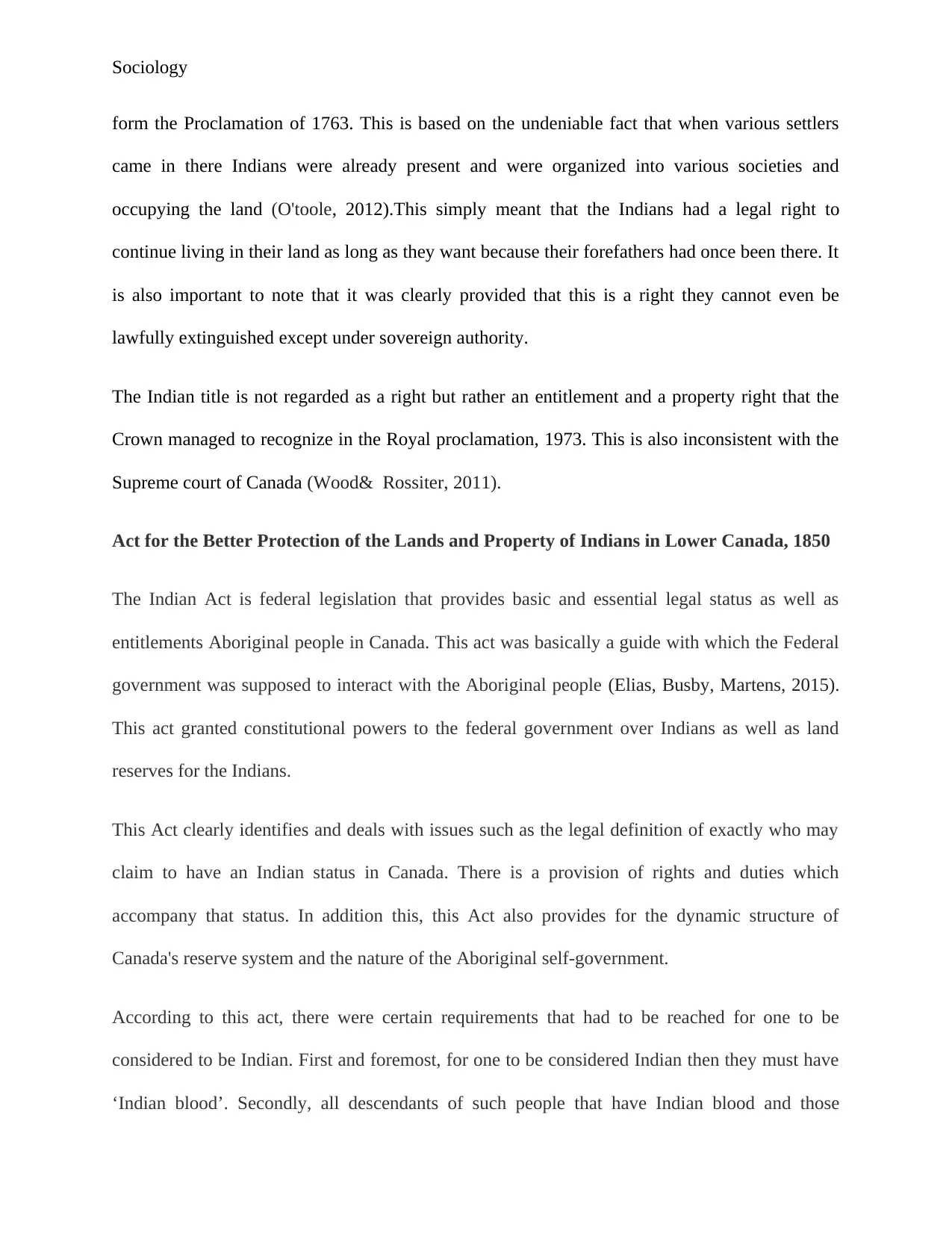
Sociology
form the Proclamation of 1763. This is based on the undeniable fact that when various settlers
came in there Indians were already present and were organized into various societies and
occupying the land (O'toole, 2012).This simply meant that the Indians had a legal right to
continue living in their land as long as they want because their forefathers had once been there. It
is also important to note that it was clearly provided that this is a right they cannot even be
lawfully extinguished except under sovereign authority.
The Indian title is not regarded as a right but rather an entitlement and a property right that the
Crown managed to recognize in the Royal proclamation, 1973. This is also inconsistent with the
Supreme court of Canada (Wood& Rossiter, 2011).
Act for the Better Protection of the Lands and Property of Indians in Lower Canada, 1850
The Indian Act is federal legislation that provides basic and essential legal status as well as
entitlements Aboriginal people in Canada. This act was basically a guide with which the Federal
government was supposed to interact with the Aboriginal people (Elias, Busby, Martens, 2015).
This act granted constitutional powers to the federal government over Indians as well as land
reserves for the Indians.
This Act clearly identifies and deals with issues such as the legal definition of exactly who may
claim to have an Indian status in Canada. There is a provision of rights and duties which
accompany that status. In addition this, this Act also provides for the dynamic structure of
Canada's reserve system and the nature of the Aboriginal self-government.
According to this act, there were certain requirements that had to be reached for one to be
considered to be Indian. First and foremost, for one to be considered Indian then they must have
‘Indian blood’. Secondly, all descendants of such people that have Indian blood and those
form the Proclamation of 1763. This is based on the undeniable fact that when various settlers
came in there Indians were already present and were organized into various societies and
occupying the land (O'toole, 2012).This simply meant that the Indians had a legal right to
continue living in their land as long as they want because their forefathers had once been there. It
is also important to note that it was clearly provided that this is a right they cannot even be
lawfully extinguished except under sovereign authority.
The Indian title is not regarded as a right but rather an entitlement and a property right that the
Crown managed to recognize in the Royal proclamation, 1973. This is also inconsistent with the
Supreme court of Canada (Wood& Rossiter, 2011).
Act for the Better Protection of the Lands and Property of Indians in Lower Canada, 1850
The Indian Act is federal legislation that provides basic and essential legal status as well as
entitlements Aboriginal people in Canada. This act was basically a guide with which the Federal
government was supposed to interact with the Aboriginal people (Elias, Busby, Martens, 2015).
This act granted constitutional powers to the federal government over Indians as well as land
reserves for the Indians.
This Act clearly identifies and deals with issues such as the legal definition of exactly who may
claim to have an Indian status in Canada. There is a provision of rights and duties which
accompany that status. In addition this, this Act also provides for the dynamic structure of
Canada's reserve system and the nature of the Aboriginal self-government.
According to this act, there were certain requirements that had to be reached for one to be
considered to be Indian. First and foremost, for one to be considered Indian then they must have
‘Indian blood’. Secondly, all descendants of such people that have Indian blood and those
⊘ This is a preview!⊘
Do you want full access?
Subscribe today to unlock all pages.

Trusted by 1+ million students worldwide
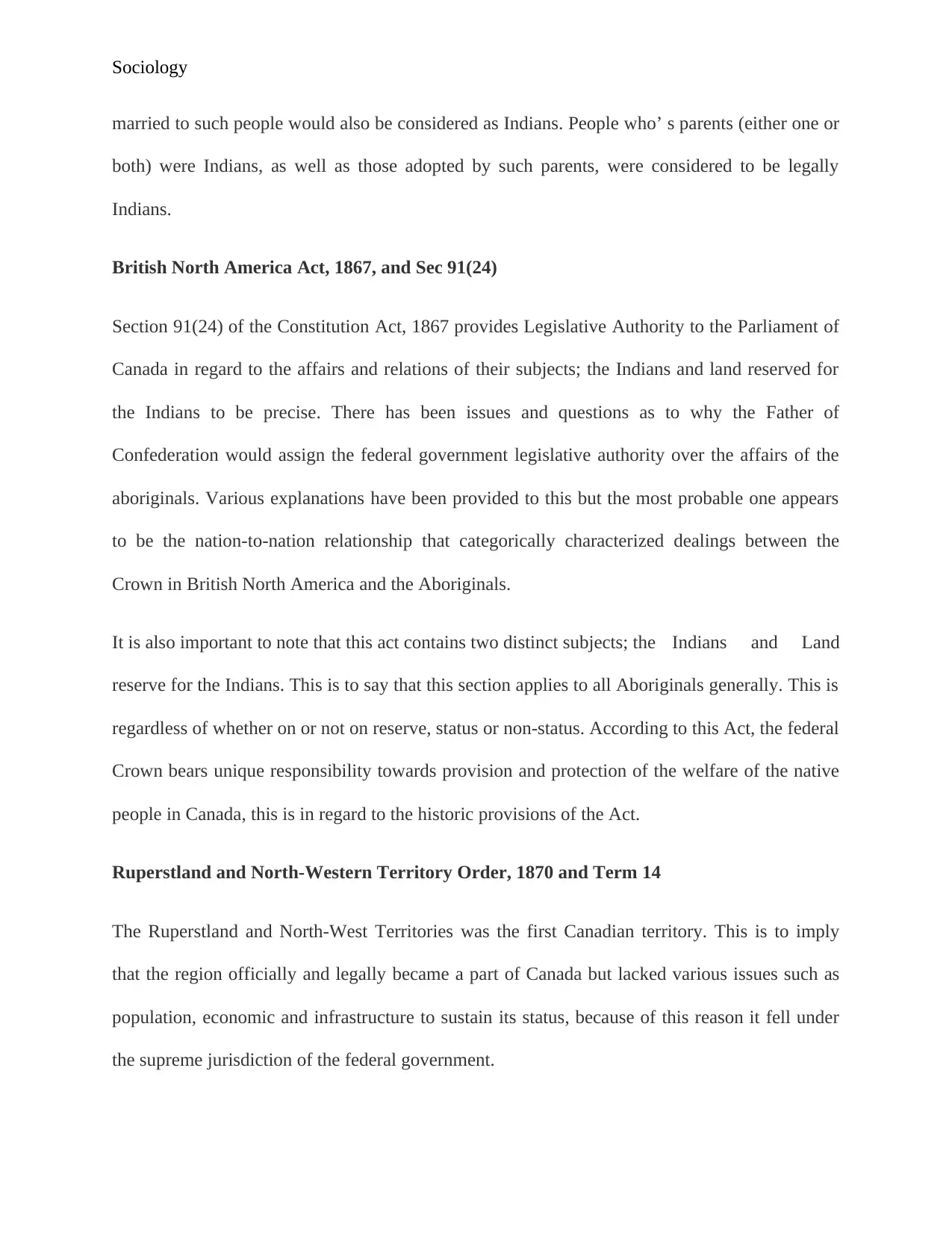
Sociology
married to such people would also be considered as Indians. People who’ s parents (either one or
both) were Indians, as well as those adopted by such parents, were considered to be legally
Indians.
British North America Act, 1867, and Sec 91(24)
Section 91(24) of the Constitution Act, 1867 provides Legislative Authority to the Parliament of
Canada in regard to the affairs and relations of their subjects; the Indians and land reserved for
the Indians to be precise. There has been issues and questions as to why the Father of
Confederation would assign the federal government legislative authority over the affairs of the
aboriginals. Various explanations have been provided to this but the most probable one appears
to be the nation-to-nation relationship that categorically characterized dealings between the
Crown in British North America and the Aboriginals.
It is also important to note that this act contains two distinct subjects; the Indians and Land
reserve for the Indians. This is to say that this section applies to all Aboriginals generally. This is
regardless of whether on or not on reserve, status or non-status. According to this Act, the federal
Crown bears unique responsibility towards provision and protection of the welfare of the native
people in Canada, this is in regard to the historic provisions of the Act.
Ruperstland and North-Western Territory Order, 1870 and Term 14
The Ruperstland and North-West Territories was the first Canadian territory. This is to imply
that the region officially and legally became a part of Canada but lacked various issues such as
population, economic and infrastructure to sustain its status, because of this reason it fell under
the supreme jurisdiction of the federal government.
married to such people would also be considered as Indians. People who’ s parents (either one or
both) were Indians, as well as those adopted by such parents, were considered to be legally
Indians.
British North America Act, 1867, and Sec 91(24)
Section 91(24) of the Constitution Act, 1867 provides Legislative Authority to the Parliament of
Canada in regard to the affairs and relations of their subjects; the Indians and land reserved for
the Indians to be precise. There has been issues and questions as to why the Father of
Confederation would assign the federal government legislative authority over the affairs of the
aboriginals. Various explanations have been provided to this but the most probable one appears
to be the nation-to-nation relationship that categorically characterized dealings between the
Crown in British North America and the Aboriginals.
It is also important to note that this act contains two distinct subjects; the Indians and Land
reserve for the Indians. This is to say that this section applies to all Aboriginals generally. This is
regardless of whether on or not on reserve, status or non-status. According to this Act, the federal
Crown bears unique responsibility towards provision and protection of the welfare of the native
people in Canada, this is in regard to the historic provisions of the Act.
Ruperstland and North-Western Territory Order, 1870 and Term 14
The Ruperstland and North-West Territories was the first Canadian territory. This is to imply
that the region officially and legally became a part of Canada but lacked various issues such as
population, economic and infrastructure to sustain its status, because of this reason it fell under
the supreme jurisdiction of the federal government.
Paraphrase This Document
Need a fresh take? Get an instant paraphrase of this document with our AI Paraphraser
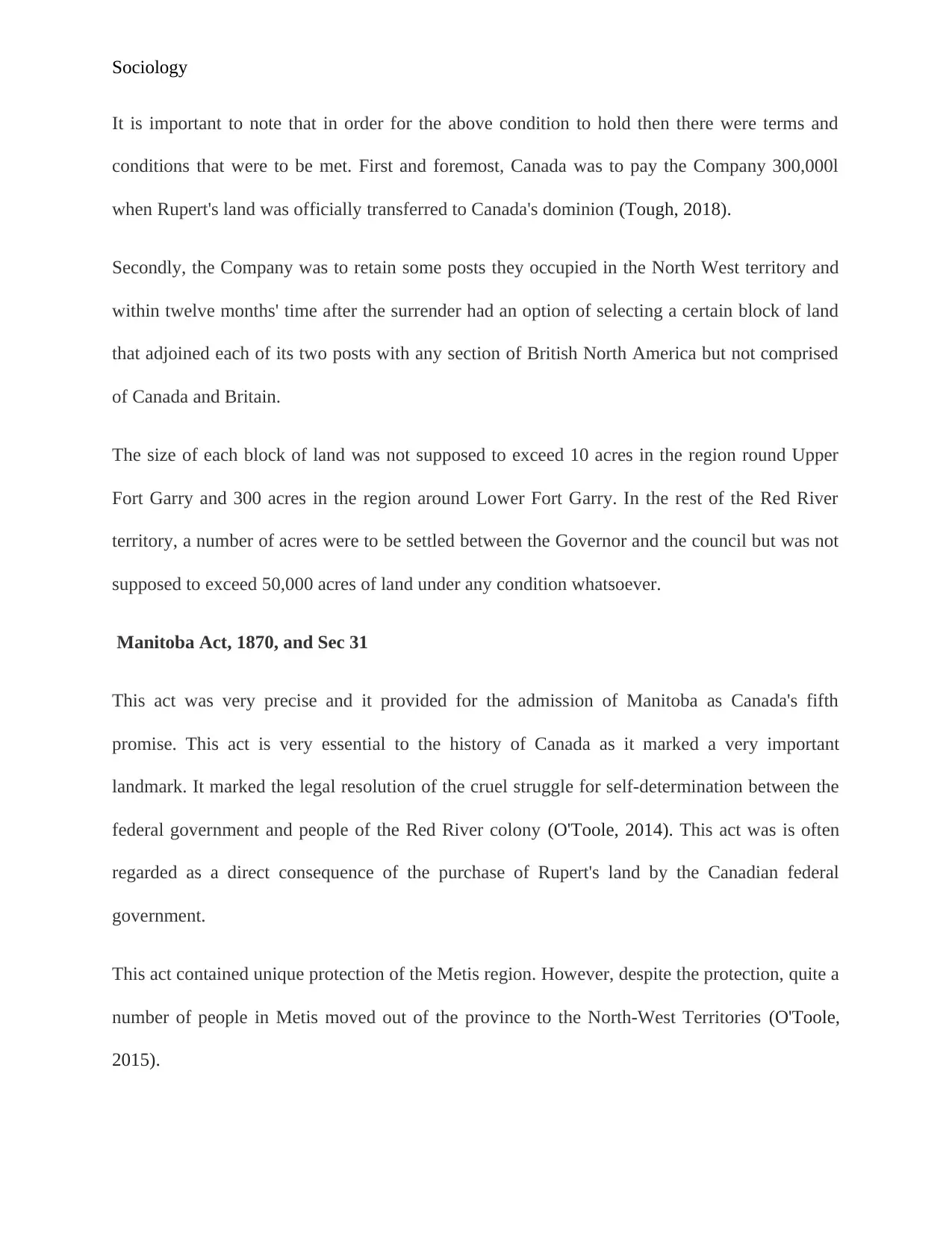
Sociology
It is important to note that in order for the above condition to hold then there were terms and
conditions that were to be met. First and foremost, Canada was to pay the Company 300,000l
when Rupert's land was officially transferred to Canada's dominion (Tough, 2018).
Secondly, the Company was to retain some posts they occupied in the North West territory and
within twelve months' time after the surrender had an option of selecting a certain block of land
that adjoined each of its two posts with any section of British North America but not comprised
of Canada and Britain.
The size of each block of land was not supposed to exceed 10 acres in the region round Upper
Fort Garry and 300 acres in the region around Lower Fort Garry. In the rest of the Red River
territory, a number of acres were to be settled between the Governor and the council but was not
supposed to exceed 50,000 acres of land under any condition whatsoever.
Manitoba Act, 1870, and Sec 31
This act was very precise and it provided for the admission of Manitoba as Canada's fifth
promise. This act is very essential to the history of Canada as it marked a very important
landmark. It marked the legal resolution of the cruel struggle for self-determination between the
federal government and people of the Red River colony (O'Toole, 2014). This act was is often
regarded as a direct consequence of the purchase of Rupert's land by the Canadian federal
government.
This act contained unique protection of the Metis region. However, despite the protection, quite a
number of people in Metis moved out of the province to the North-West Territories (O'Toole,
2015).
It is important to note that in order for the above condition to hold then there were terms and
conditions that were to be met. First and foremost, Canada was to pay the Company 300,000l
when Rupert's land was officially transferred to Canada's dominion (Tough, 2018).
Secondly, the Company was to retain some posts they occupied in the North West territory and
within twelve months' time after the surrender had an option of selecting a certain block of land
that adjoined each of its two posts with any section of British North America but not comprised
of Canada and Britain.
The size of each block of land was not supposed to exceed 10 acres in the region round Upper
Fort Garry and 300 acres in the region around Lower Fort Garry. In the rest of the Red River
territory, a number of acres were to be settled between the Governor and the council but was not
supposed to exceed 50,000 acres of land under any condition whatsoever.
Manitoba Act, 1870, and Sec 31
This act was very precise and it provided for the admission of Manitoba as Canada's fifth
promise. This act is very essential to the history of Canada as it marked a very important
landmark. It marked the legal resolution of the cruel struggle for self-determination between the
federal government and people of the Red River colony (O'Toole, 2014). This act was is often
regarded as a direct consequence of the purchase of Rupert's land by the Canadian federal
government.
This act contained unique protection of the Metis region. However, despite the protection, quite a
number of people in Metis moved out of the province to the North-West Territories (O'Toole,
2015).
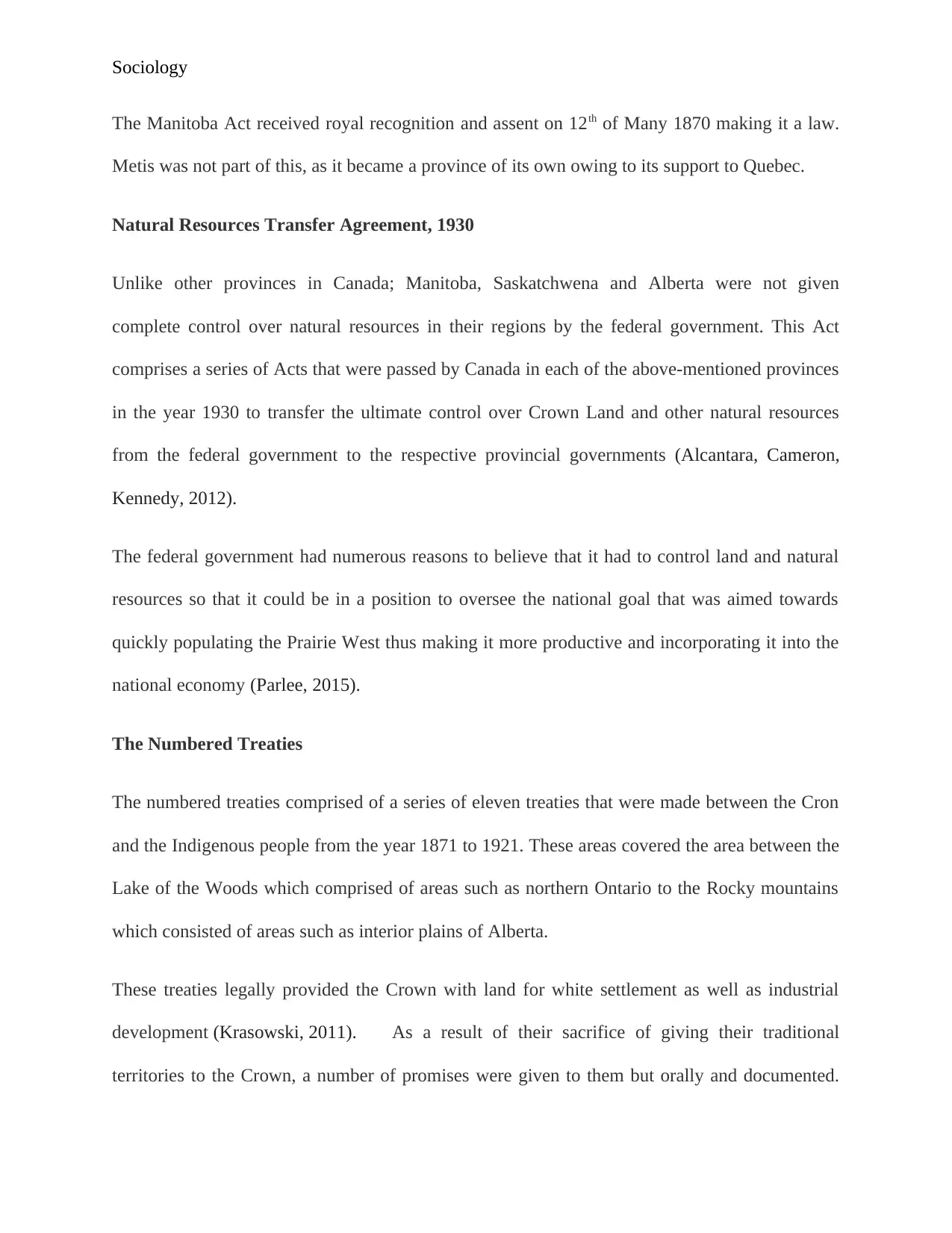
Sociology
The Manitoba Act received royal recognition and assent on 12th of Many 1870 making it a law.
Metis was not part of this, as it became a province of its own owing to its support to Quebec.
Natural Resources Transfer Agreement, 1930
Unlike other provinces in Canada; Manitoba, Saskatchwena and Alberta were not given
complete control over natural resources in their regions by the federal government. This Act
comprises a series of Acts that were passed by Canada in each of the above-mentioned provinces
in the year 1930 to transfer the ultimate control over Crown Land and other natural resources
from the federal government to the respective provincial governments (Alcantara, Cameron,
Kennedy, 2012).
The federal government had numerous reasons to believe that it had to control land and natural
resources so that it could be in a position to oversee the national goal that was aimed towards
quickly populating the Prairie West thus making it more productive and incorporating it into the
national economy (Parlee, 2015).
The Numbered Treaties
The numbered treaties comprised of a series of eleven treaties that were made between the Cron
and the Indigenous people from the year 1871 to 1921. These areas covered the area between the
Lake of the Woods which comprised of areas such as northern Ontario to the Rocky mountains
which consisted of areas such as interior plains of Alberta.
These treaties legally provided the Crown with land for white settlement as well as industrial
development (Krasowski, 2011). As a result of their sacrifice of giving their traditional
territories to the Crown, a number of promises were given to them but orally and documented.
The Manitoba Act received royal recognition and assent on 12th of Many 1870 making it a law.
Metis was not part of this, as it became a province of its own owing to its support to Quebec.
Natural Resources Transfer Agreement, 1930
Unlike other provinces in Canada; Manitoba, Saskatchwena and Alberta were not given
complete control over natural resources in their regions by the federal government. This Act
comprises a series of Acts that were passed by Canada in each of the above-mentioned provinces
in the year 1930 to transfer the ultimate control over Crown Land and other natural resources
from the federal government to the respective provincial governments (Alcantara, Cameron,
Kennedy, 2012).
The federal government had numerous reasons to believe that it had to control land and natural
resources so that it could be in a position to oversee the national goal that was aimed towards
quickly populating the Prairie West thus making it more productive and incorporating it into the
national economy (Parlee, 2015).
The Numbered Treaties
The numbered treaties comprised of a series of eleven treaties that were made between the Cron
and the Indigenous people from the year 1871 to 1921. These areas covered the area between the
Lake of the Woods which comprised of areas such as northern Ontario to the Rocky mountains
which consisted of areas such as interior plains of Alberta.
These treaties legally provided the Crown with land for white settlement as well as industrial
development (Krasowski, 2011). As a result of their sacrifice of giving their traditional
territories to the Crown, a number of promises were given to them but orally and documented.
⊘ This is a preview!⊘
Do you want full access?
Subscribe today to unlock all pages.

Trusted by 1+ million students worldwide
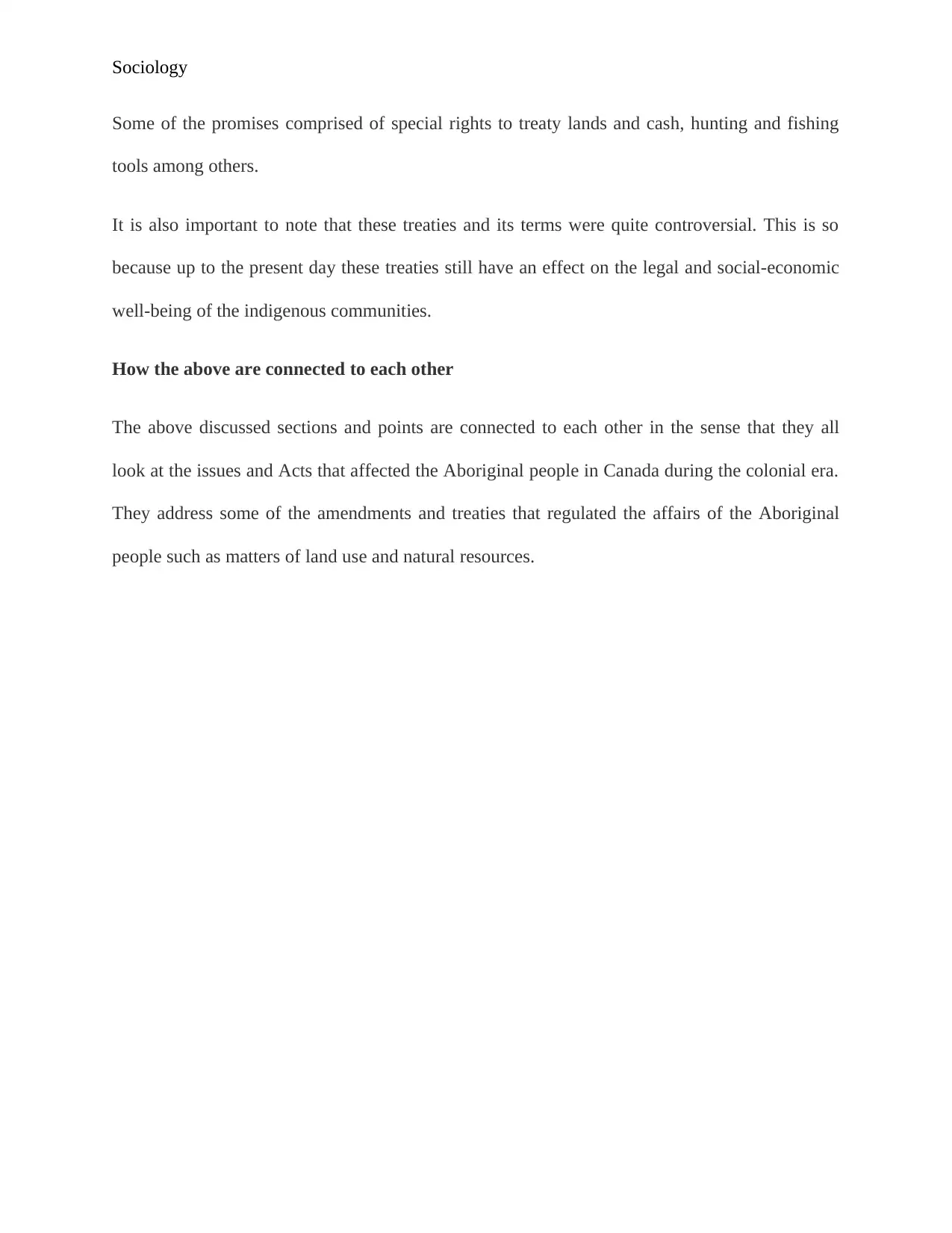
Sociology
Some of the promises comprised of special rights to treaty lands and cash, hunting and fishing
tools among others.
It is also important to note that these treaties and its terms were quite controversial. This is so
because up to the present day these treaties still have an effect on the legal and social-economic
well-being of the indigenous communities.
How the above are connected to each other
The above discussed sections and points are connected to each other in the sense that they all
look at the issues and Acts that affected the Aboriginal people in Canada during the colonial era.
They address some of the amendments and treaties that regulated the affairs of the Aboriginal
people such as matters of land use and natural resources.
Some of the promises comprised of special rights to treaty lands and cash, hunting and fishing
tools among others.
It is also important to note that these treaties and its terms were quite controversial. This is so
because up to the present day these treaties still have an effect on the legal and social-economic
well-being of the indigenous communities.
How the above are connected to each other
The above discussed sections and points are connected to each other in the sense that they all
look at the issues and Acts that affected the Aboriginal people in Canada during the colonial era.
They address some of the amendments and treaties that regulated the affairs of the Aboriginal
people such as matters of land use and natural resources.
Paraphrase This Document
Need a fresh take? Get an instant paraphrase of this document with our AI Paraphraser
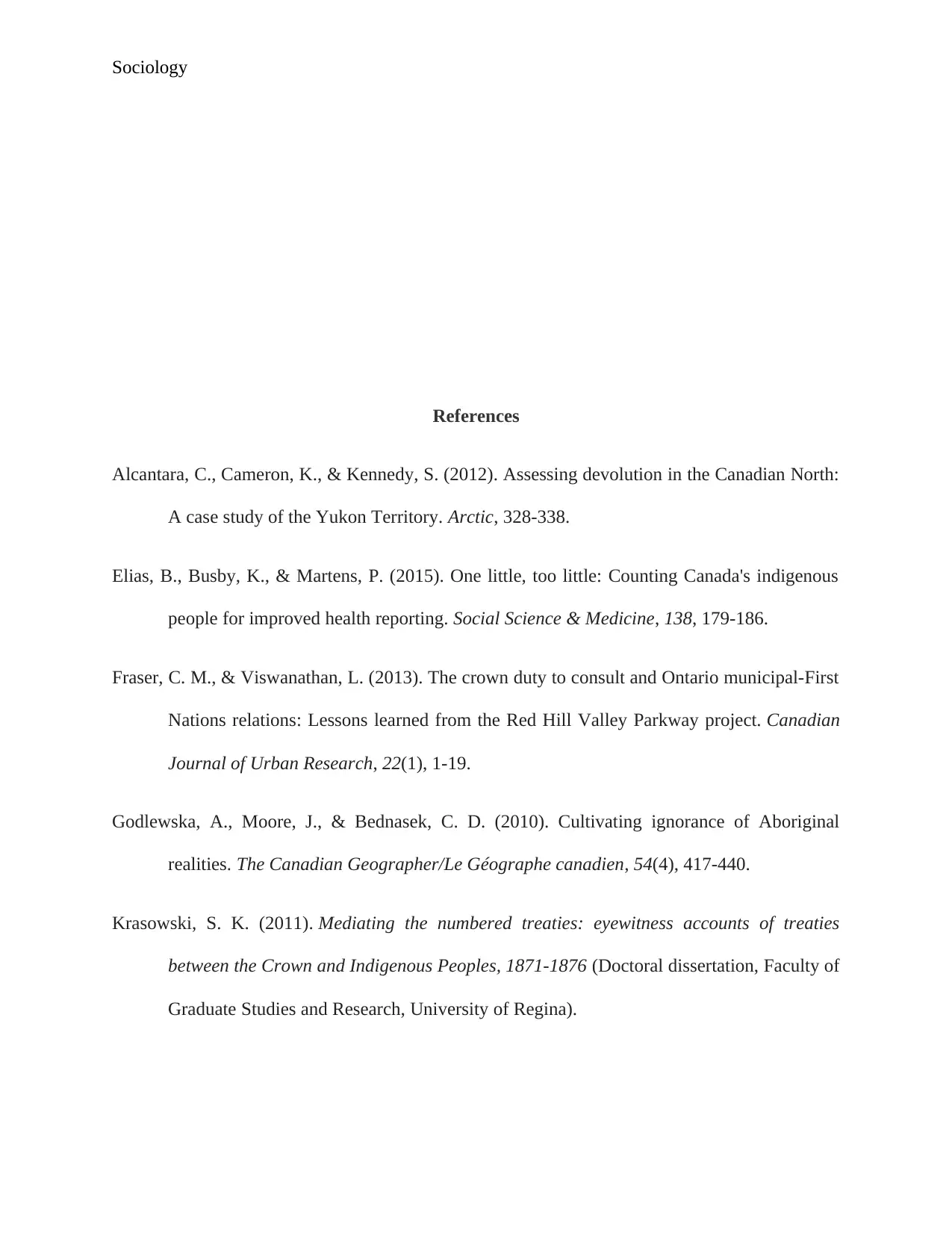
Sociology
References
Alcantara, C., Cameron, K., & Kennedy, S. (2012). Assessing devolution in the Canadian North:
A case study of the Yukon Territory. Arctic, 328-338.
Elias, B., Busby, K., & Martens, P. (2015). One little, too little: Counting Canada's indigenous
people for improved health reporting. Social Science & Medicine, 138, 179-186.
Fraser, C. M., & Viswanathan, L. (2013). The crown duty to consult and Ontario municipal-First
Nations relations: Lessons learned from the Red Hill Valley Parkway project. Canadian
Journal of Urban Research, 22(1), 1-19.
Godlewska, A., Moore, J., & Bednasek, C. D. (2010). Cultivating ignorance of Aboriginal
realities. The Canadian Geographer/Le Géographe canadien, 54(4), 417-440.
Krasowski, S. K. (2011). Mediating the numbered treaties: eyewitness accounts of treaties
between the Crown and Indigenous Peoples, 1871-1876 (Doctoral dissertation, Faculty of
Graduate Studies and Research, University of Regina).
References
Alcantara, C., Cameron, K., & Kennedy, S. (2012). Assessing devolution in the Canadian North:
A case study of the Yukon Territory. Arctic, 328-338.
Elias, B., Busby, K., & Martens, P. (2015). One little, too little: Counting Canada's indigenous
people for improved health reporting. Social Science & Medicine, 138, 179-186.
Fraser, C. M., & Viswanathan, L. (2013). The crown duty to consult and Ontario municipal-First
Nations relations: Lessons learned from the Red Hill Valley Parkway project. Canadian
Journal of Urban Research, 22(1), 1-19.
Godlewska, A., Moore, J., & Bednasek, C. D. (2010). Cultivating ignorance of Aboriginal
realities. The Canadian Geographer/Le Géographe canadien, 54(4), 417-440.
Krasowski, S. K. (2011). Mediating the numbered treaties: eyewitness accounts of treaties
between the Crown and Indigenous Peoples, 1871-1876 (Doctoral dissertation, Faculty of
Graduate Studies and Research, University of Regina).
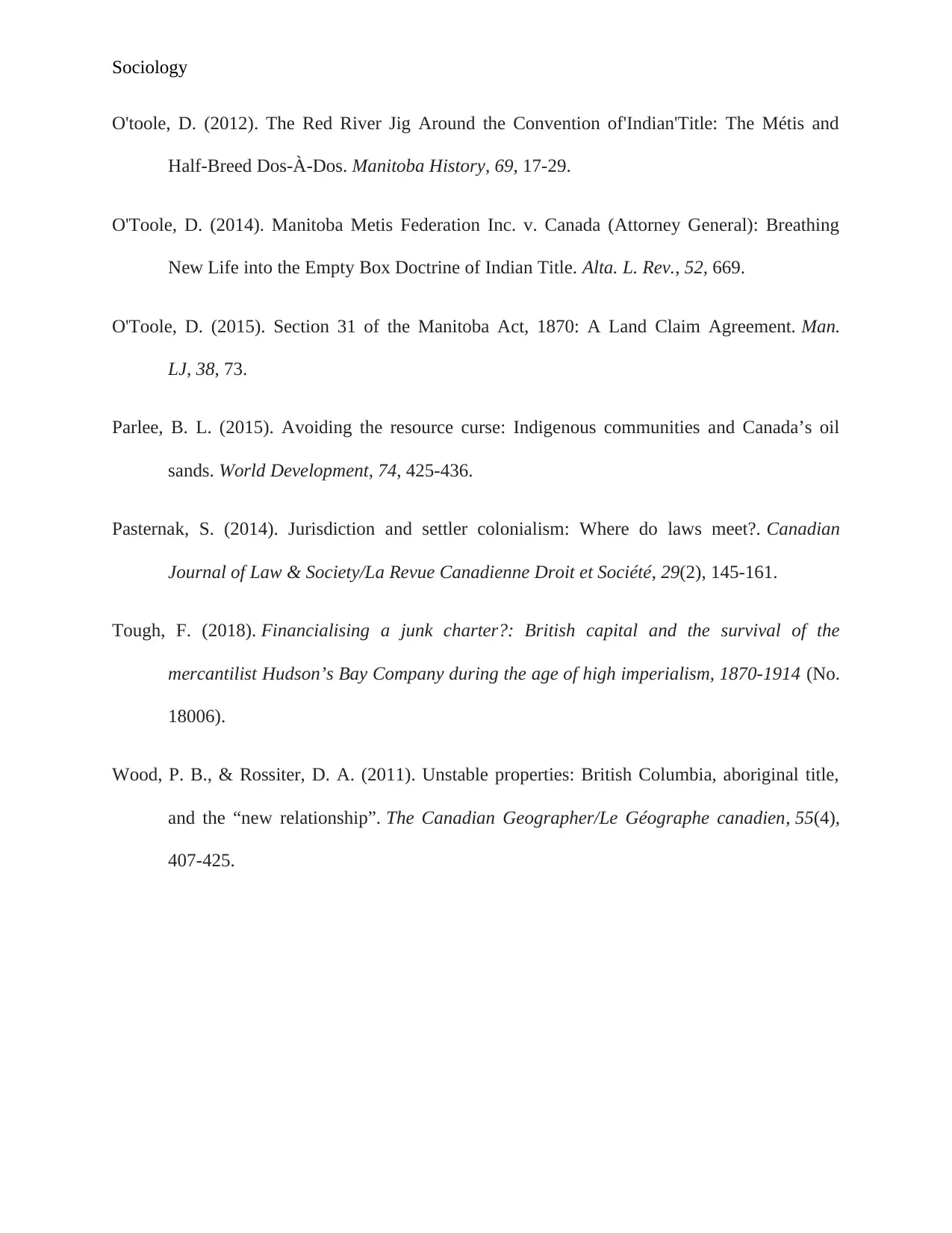
Sociology
O'toole, D. (2012). The Red River Jig Around the Convention of'Indian'Title: The Métis and
Half-Breed Dos-À-Dos. Manitoba History, 69, 17-29.
O'Toole, D. (2014). Manitoba Metis Federation Inc. v. Canada (Attorney General): Breathing
New Life into the Empty Box Doctrine of Indian Title. Alta. L. Rev., 52, 669.
O'Toole, D. (2015). Section 31 of the Manitoba Act, 1870: A Land Claim Agreement. Man.
LJ, 38, 73.
Parlee, B. L. (2015). Avoiding the resource curse: Indigenous communities and Canada’s oil
sands. World Development, 74, 425-436.
Pasternak, S. (2014). Jurisdiction and settler colonialism: Where do laws meet?. Canadian
Journal of Law & Society/La Revue Canadienne Droit et Société, 29(2), 145-161.
Tough, F. (2018). Financialising a junk charter?: British capital and the survival of the
mercantilist Hudson’s Bay Company during the age of high imperialism, 1870-1914 (No.
18006).
Wood, P. B., & Rossiter, D. A. (2011). Unstable properties: British Columbia, aboriginal title,
and the “new relationship”. The Canadian Geographer/Le Géographe canadien, 55(4),
407-425.
O'toole, D. (2012). The Red River Jig Around the Convention of'Indian'Title: The Métis and
Half-Breed Dos-À-Dos. Manitoba History, 69, 17-29.
O'Toole, D. (2014). Manitoba Metis Federation Inc. v. Canada (Attorney General): Breathing
New Life into the Empty Box Doctrine of Indian Title. Alta. L. Rev., 52, 669.
O'Toole, D. (2015). Section 31 of the Manitoba Act, 1870: A Land Claim Agreement. Man.
LJ, 38, 73.
Parlee, B. L. (2015). Avoiding the resource curse: Indigenous communities and Canada’s oil
sands. World Development, 74, 425-436.
Pasternak, S. (2014). Jurisdiction and settler colonialism: Where do laws meet?. Canadian
Journal of Law & Society/La Revue Canadienne Droit et Société, 29(2), 145-161.
Tough, F. (2018). Financialising a junk charter?: British capital and the survival of the
mercantilist Hudson’s Bay Company during the age of high imperialism, 1870-1914 (No.
18006).
Wood, P. B., & Rossiter, D. A. (2011). Unstable properties: British Columbia, aboriginal title,
and the “new relationship”. The Canadian Geographer/Le Géographe canadien, 55(4),
407-425.
⊘ This is a preview!⊘
Do you want full access?
Subscribe today to unlock all pages.

Trusted by 1+ million students worldwide

Sociology
1 out of 10
Related Documents
Your All-in-One AI-Powered Toolkit for Academic Success.
+13062052269
info@desklib.com
Available 24*7 on WhatsApp / Email
![[object Object]](/_next/static/media/star-bottom.7253800d.svg)
Unlock your academic potential
Copyright © 2020–2025 A2Z Services. All Rights Reserved. Developed and managed by ZUCOL.





